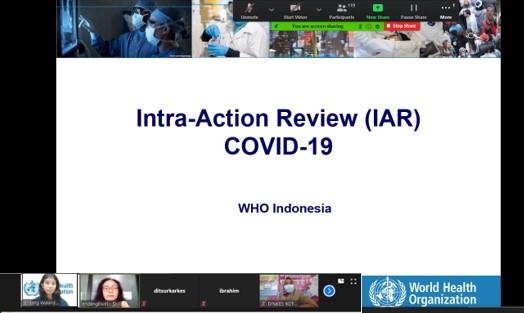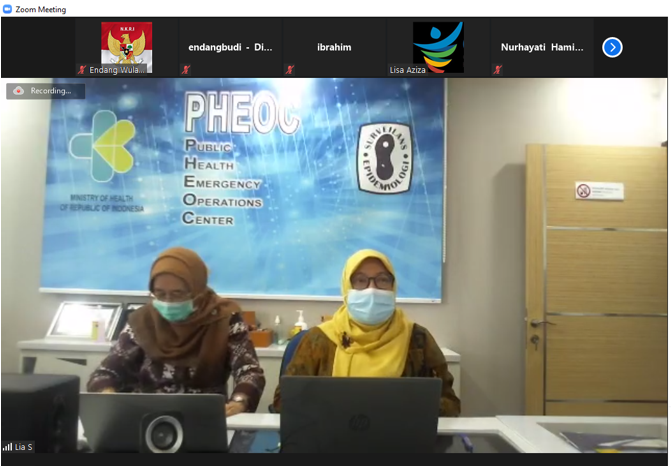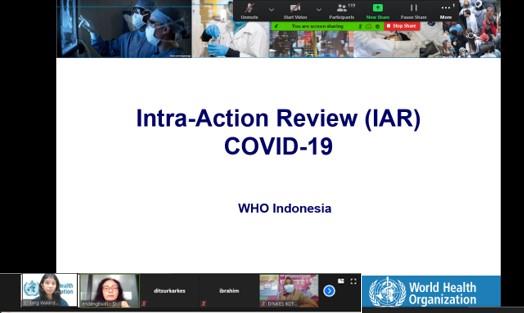Between 11 to 14 August 2020, WHO supported the Ministry of Health to conduct an Intra-Action Review (IAR) for the COVID-19 response in Indonesia. The IAR is a comprehensive multisector qualitative review of actions undertaken thus far in response to an ongoing emergency. It is a valuable mechanism to identify gaps and opportunities for learning and improvement to better respond to the COVID-19 outbreak.
The Indonesian IAR was undertaken as a recommendation from the fourth meeting of the International Health Regulations (2005) Emergency Committee in July regarding the outbreak of COVID-19. This meeting was convened by the WHO Director-General and it highlighted the importance of continuous collective learning by bringing together relevant stakeholders to critically and systematically analyse actions undertaken in an emergency response.
In Indonesia, the IAR comprehensively covered the nine key pillars of the COVID-19 response: 1) command and coordination; (2) risk communication and community empowerment; (3) surveillance, rapid response teams and case investigation; (4) points of entry, international travel, and transport; (5) laboratory; (6) infection control; (7) case management; (8) operational and logistics support and (9) maintaining essential health services and systems. It also included special considerations for community transmission settings and low-capacity and humanitarian settings.

Caption: WHO presented the overview of Intra-Action Review (IAR) as part of preparedness and response cycle in line with International Health Regulations (IHR) and pandemic risk management. Credit: Endang Wulandari/ WHO
Preparation for the IAR
Preparation for the IAR began in July with the formation of a core management team and identification of training facilitators spanning the nine pillars.
The core management team conducted a thorough desk review of standard operating procedures, guidelines, policies, reports, and a timeline of milestones of COVID-19 response actions. Between 15 and 17 July, the findings of the desk review were presented to the key stakeholders. This was followed by an orientation on the IAR scope and process to stakeholders on 28 July.
On 29 July, WHO supported a facilitator training to equip participants with specific techniques and tools necessary for the IAR referring to WHO IAR guidelines. The facilitators were selected from leaders already holding responsibility within the nine pillars of the COVID-19 response, giving them ownership over the IAR pillar activities and securing their commitment to improving the response.
A briefing of the facilitators on 5 August served as mock session to ensure smooth IAR implementation with the broad range of stakeholders. The facilitators were able to promote interactive discussion among stakeholders of each pillar.
Questionnaires were also filled by all IAR participants to capture the participants’ inputs on the successes and opportunities for improvement of the COVID-19 response to date. Information from these documents complemented the interactive qualitative discussion during the IAR.

Caption: The Public Health Emergency Operations Center participated in the IAR, highlighting surveillance best practices, gaps and recommendations to improve the COVID-19 response. Credit: Endang Wulandari / WHO
Conducting the IAR
The IAR was held virtually from 11 to 14 August. It brought together many stakeholders from different sectors including the Ministry of Health (MoH), National Disaster Agency, Secretariat Cabinet, Information and Communication Ministry, armed forces, and representatives from Provincial Health Offices, hospitals, primary healthcare centers and other international partners such as FAO, UNICEF, UN-OCHA, IFRC, WFP and ILO.
Since the outbreak of COVID-19 and the declaration of the health emergency, Indonesia has adapted its operational response plan, conducted risk assessments and put in place numerous activities to combat the spread of disease and secure the welfare of Indonesians.
The IAR studied the response plan, reporting systems and activity implementation to identify practical areas for remediation and sustained improvement of the ongoing COVID-19 response.
Among others, recommendations resulting from the IAR included improving the command and coordination among multisectoral stakeholders at the national and subnational levels, periodic monitoring of response plan indicators (including surveillance and laboratory coordination) and better triage at health facilities to avoid exposure of patients and the health workforce to COVID-19. Enforcing the implementation and monitoring of large-scale social restrictions and empowering the community as agents for change through COVID-19 key messaging and engagement were also deemed areas for improvement. Further, the IAR suggested to improve telemedicine to prevent COVID-19 exposure and maintain essential health services such as immunization, tuberculosis, HIV, and non-communicable diseases programmes.
Going forward
It will now be the responsibility of all stakeholders to implement the recommendations agreed upon during the IAR. These recommendations will be used as inputs to review the current COVID-19 response plan in Indonesia and the IAR stakeholders will play an active role in reviewing and monitoring the COVID-19 response indicators.
The outcomes of the IAR will also contribute to the Partners Platform and the annual IHR State Party Annual Reporting to the World Health Assembly where Indonesia will share their IAR learning experiences to regional and global committees.
Overall, the IAR brought together multiple stakeholders of the emergency response to agree on tactics to further improve the preparedness and response capability for the current emergency facing Indonesia. Through a systematic, constructive and collective learning opportunity, the IAR has offered a number of recommendations to be implemented to strengthen the national COVID-19 response. Leadership, commitment and teamwork from the core management team, facilitators and all stakeholders were key to the success of the IAR.
WHO, the Ministry of Health and partners stand ready to support any requests from the provinces to conduct provincial level IARs.
Read the IAR here: https://infeksiemerging.kemkes.go.id/downloads/?dl_cat=7#.X4QD7eWlYVF
Main thumbnail caption: The Ministry of Health presented follow-up actions of Intra Action Review (IAR). The IAR results will be used as input to review the national COVID-19 response plan and inputs for partners’ platform and IHR State Party Annual Reporting at the World Health Assembly.

